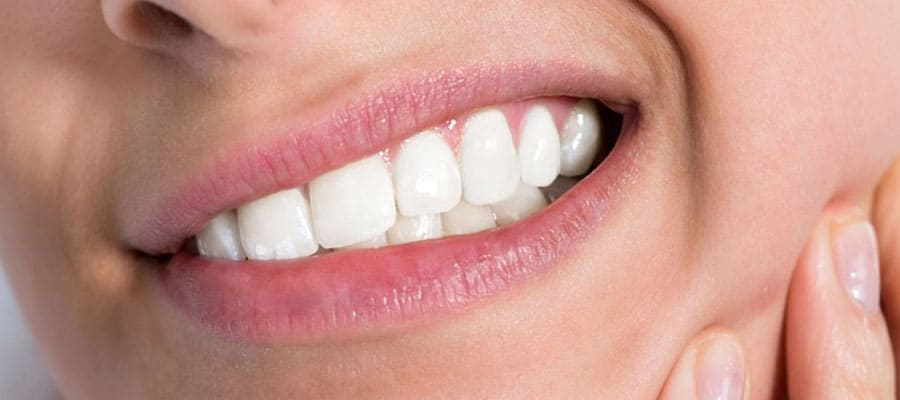
Bruxism | Teeth Grinding | Teeth Clenching Treatment | Jaw Joint Disease
Teeth grinding and teeth clenching can be treated with a night guard (splint) or a Botox procedure.
What is teeth grinding or teeth clenching?
Bruxism, also known as teeth grinding or teeth clenching, is a disease that occurs while sleeping at night, which the patient is not aware of during the day and can cause severe complications (gingival withdrawal, broken teeth, loss of teeth, jaw joint disease, headache) if not treated. Stress accumulated during the day is released at night by unconsciously grinding the teeth against each other or clenching them together. In some cases no pain in the jaw joint occurs for many years but the patient may hear a click sound in the jaw joint while having a headache, which gets only worse when not treated.
What can cause teeth grinding or teeth clenching?
Abrasion and breaking of the teeth, gingival recession and consequently sensitivity to hot and cold food, a click sound from the jaw joint, limitation and difficulty in opening and closing the mouth, tension of the jaw while yawning, difficult opening of the jaw in the morning, locking of the jaw, pain in the jaw joint, headache and pain in the temples are results of teeth grinding and clenching (bruxism).
How can teeth grinding or teeth clenching be treated?
The Jaw Joint Prosthesis Specialist takes measurements of your teeth and prepares a personal plaque (splint). Your dentist will call you for weekly and monthly check-ups.
Masseter Botox treatment can help prevent teeth grinding and clenching (bruxism).
What is jaw joint disease?
These are diseases seen in the hard and soft tissue of the jaw joint and the jaw joint disc. There might be a click sound coming from the jaw, the jaw might get locked, there might be pain or difficulty in opening the mouth completely. If jaw joint diseases are not treated they will continue to advance. The biggest cause is bruxism, also known as teeth grinding or teeth clenching. The sooner the treatment is started, the better the results.
Where should I apply to for jaw joint diseases, teeth grinding or teeth clenching?
You should apply to a Jaw Joint Prosthesis Specialist to get your jaw joint disease or teeth grinding treated. In advanced cases, a Maxillofacial Surgery Specialist is consulted. With the right diagnosis and treatment you can get rid of this condition. You should not interrupt your treatment and controls and continue patiently.
What should I pay attention to in jaw joint diseases?
It is important to only eat soft foods. Food should be eaten in small and not big bites.
No extreme yawning
Not sleeping on the belly
No chewing gum
Avoiding stress
The jaw should be supported from below while yawning.
The treatment for jaw joint disease, teeth grinding and teeth clenching should be started as soon as possible.
For how long must I use the splint that was given to me for the treatment of teeth grinding – teeth clenching?
This splint is a transparent oral night plaque that has been specially produced by the dentist for the patient. The treatment duration for bruxism is approximately 6 months. But this duration can change depending on the severity of the disease. The splint provides muscle relaxation and regulates jaw joint closure. It minimizes dysfunction and prevents and cures the damages of grinding.
The treatment duration varies from 3-6 months.
How often should I visit the dentist for my teeth grinding – clenching treatment and the splint that was given to me?
You should visit the dentist one week after the splint was given to you and then once a month. Your treatment will last at least 3 months.
Why do jaw joint diseases occur?
There are many factors causing jaw joint diseases. The most common ones are;
- Teeth grinding and teeth clenching (bruxism)
- Unilateral chewing
- Stress
- Tooth loss
- Traumas to the chin region
- Neurological psychiatric problems
- Habits such as chewing gum, chewing fingernails or chewing on pencils
Ho can teeth grinding – clenching (bruxism) be treated?
First the teeth, chewing muscles, jaw joint and closure system are examined in detail by the specialist dentist. A hundred percent recovery may not always be possible. The goal of the dentist is to restore normal and painless jaw joint functions to the patient. For this purpose, treatments such as splints, Botox, exercises, painkillers and muscle relaxants are applied. The treatment method is chosen according to the grade of teeth grinding – clenching.